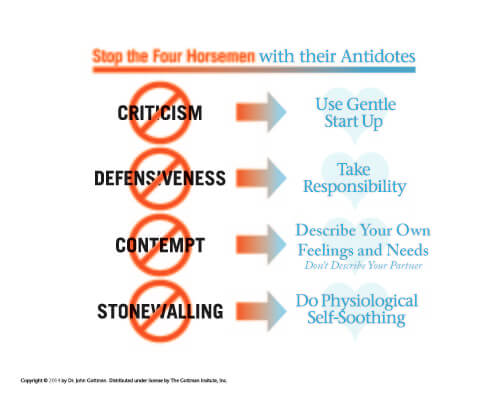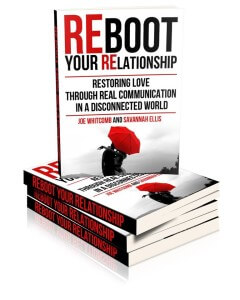 Can you recognize this all-too-common pattern in your relationship?
Can you recognize this all-too-common pattern in your relationship?
With a life of its own, this circular pattern reinforces itself each step of the way and gets nowhere.
It begins with “normal disappointment” as we transition from the initial stage of romantic bliss to the reality stage of living together in the world. When disappointments are not processed, or are misinterpreted, feelings of resentment fester.
Resentment is a powerful force, not to be underestimated. if left untreated, they are the cancer cells of dysfunctional behaviors in relationships.
Identifying the negative coping styles and patterns in yourself & in your relationship
Problem vs. Pattern
It is important to distinguish between a problem and a pattern. Problems are an integral part of any relationship. How we cope with problems becomes a pattern for resolution. It takes concerted effort, at first, to disconnect your feelings during a high level discussion. Getting to an enlightened state where you can sincerely agree to disagree without disdain and anger is our goal. When an “enlightened” couple become keenly aware of their issue and detach their feelings from it, what’s left is a clinical and clear path to resolution.
Fighting becomes a discussion and disagreements become an honest and authentic avenue for growth.
When you can discuss a previously touchy subject objectively, you’ll begin to revere the crack in your partner’s vase and enjoy a vibrant and passionate relationship that does not suffer from boredom, anger or annoyance. When you achieve this level of engagement, you’ll have a level of awareness, commitment, loyalty and love that comes only when both parties step back and assess, understand, accept and grow. Just as your bliss may have disintegrated to disdain over time, rebuilding your relationship requires won’t happen overnight.
It also rarely occurs without the right tools and training.
When problems keeps recurring, if arguments or conflicts keep rearing their ugly head, placing you into a dysfunctional dance on a regular basis, then the challenge itself may not be the problem. In nearly all cases of relationship meltdown, the manner and style in which problems are resolved is often the real culprit, not the perceived issue.
Before we can create the bliss and strength of a solid relationship, however, we must first learn to recognize when our problems have become patterns leading us into that dysfunctional dance. Before you and your partner can sweep away your past challenges and step into the passion and love you both desire, be brutally honest with what isn’t working now and what didn’t work in the past. We don’t need to spend an inordinate amount of time here, but in order to NOT repeat the mistakes of the past, one needs to acknowledge what wasn’t working before.
Signs Of Dysfunction
There are several common communication signals that will fire when trouble may be brewing. Every couple has their arguments and conflicts, but the manner in how they are dealt with comes first. If we don’t have a deep sense of who we are and how we communicate, we are doomed to repeat this poor coping strategy regardless of the topic of “discussion.” Below, we’ll discuss several scenarios that may feel awkwardly familiar. You may relate to one or more of these. When most people read them, the first person that comes to mind is their partner. “Hey, honey… that sounds just like YOU!”
While it is impossible not to think about your partner’s dysfunction, we encourage you to read this chapter twice. The first time read it for a general understanding of the problem. During your second read, take your time and do an honest evaluation on how one or more of these styles relates to your current communication challenge. If you have trouble, ask your partner! When you are ready to accept a non-judgmental evaluation of your areas for improvement, the corrupt “program” can be isolated and you’ll be ready to install V2.0.
There are dozens of dysfunctional “dances” human beings fall into.
Below are six common ones:
– The Harsh Startup
– The Four Horsemen
– Flooding
– Body Language
– Failed Repair Attempts
– Altered Memories
– The Harsh Startup
Does one partner begin a conversation with a harsh tone? Something negative or accusatory? This sort of beginning dooms the conversation from the start. Studies have shown that the majority of our communication is non-verbal. The cues we get through body language and “tone” have more to do with understanding a person’s point of view as opposed to the actual words being used.
Before reflecting on your partner’s harsh tone, consider your own… How would you like it if the other person screamed out their complaint to you? Humans naturally go on the defensive when attacked, both physically and verbally. What if that same person approached you with a softer tone and a more positive attitude? How would that affect your communication?
-Compare, “You forgot to take out the Trash. Again!” to a far more gentler, “Oh, the trash isn’t emptied yet and I’ve got the kids to deal with. Do you mind? Thanks.”
One of these starts a fight, while the other one will probably end with, “Sure, hon. But I’ve got to be off to work after that.”

The Four Horsemen
Best-selling author, John Gottman refers to as the Four Horsemen of an apocalyptic relationship. Starting up conversations on a negative note can lead the relationship through a series of four types of negative interactions he calls, the Four Horsemen
– Criticism
– Contempt
– Defensiveness
– Stonewalling
Criticism is different from complaining. We all have at least a little complaint about someone, but a criticism differs in how these complaints are expressed. A complaint focuses on one specific behavior- you didn’t take out the trash, you left the seat up on the toilet again, for example. A criticism attacks the character of the person. You are so selfish, you’re just a lazy bum, you are inconsiderate, and so on. Criticism happens from time to time, but having too much of it can lead to the second horseman; contempt.
Contempt communicates disgust at the person it is intended for, not only in words but body language. Eye rolling or smirks, coupled with sarcasm, name-calling, and mockery are all body language signals of contempt. When contempt is in one’s heart, it is impossible to resolve the conflict because the one with contempt is not open to the possibility of resolution. The contempt acts as a barrier to healing.
Contempt causes the other partner to become defensive. This puts the blame back on the criticizer but never solves the problem at hand and creates more escalation of discourse. Eventually one partner tunes the other out, which leads to our fourth horseman; Stonewalling. More common in men than in women, it is a way of avoiding the flood of negativity as a conflict escalates. The stonewaller ignores his partner, showing no signs of responding, which of course makes his partner all the angrier.
Stonewalling itself is criticized and the vicious cycle is complete. The man may go off by himself in an effort to not react or show his anger, but the wife perceives this as being ignored and rejecting her, which begins the cycle. The wife complains, the husband withdraws, and so the wife complains the more.
To avoid the Four Horsemen in the first place, you need a strong base of love and respect to overcome any negativity and learn how to properly deal with any conflict. There are clear strategies for avoiding and/or repairing this disempowering cycle or pattern. Our WE3 immersion retreats have a 92%+ rate of success for permanently eliminating this downward spiral of dysfunction for couples. It doesn’t matter if you are having your first fight or are filing divorce papers that week, when couples take the steps to understand and positively cope with their “virus-laden” patterns, a new program is ready to be installed.
Negative Coping Patterns
In addition to the “Four Horsemen” there are other negative coping patterns and signals that you may recognize in yourself or your partner.
Flooding
Another negative pattern of coping is when one partner becomes flooded by so much negativity by the other they become shell-shocked. This causes them to emotionally disengage or stonewall to protect themselves.
Flooding is similar to being at school as a kid, when the bullies just keep at you day in and day out. Enough people yelling and teasing you to the point where you want to crawl under a rock for self-preservation. As adults it can still happen, only the bully isn’t a kid on the playground, but your partner. Being under constant attack, what would you expect the other person to do? There’s only so much negativity that one can take before they just say “Enough!” and go off somewhere to disconnect from the world.
If you see signs that you or your partner is being flooded, ease up for a while. Ease up a lot. You don’t have to resolve all conflicts immediately. Sometimes, the proper thing to do is nothing. When a flood is occurring, the best strategy may be to let the rain subside before attempting to dry out the basement.
Body Language
There are physiological changes in the body that accompany flooding and other negative reactions, including increased blood pressure, heart rate and adrenaline that makes it impossible to maintain any discussion in a civil manner. When a person is visibly upset, it becomes harder to pay attention to what the other is saying or figure a way to intellectually resolve the situation. The other person often reacts more out of reflex then logic. This reactive response is readily apparent in their body language.
Ever seen someone’s face flush red with anger? Or too angry to properly form words? It’s a physiological fact that emotions affect your body and metabolism. You might twitch when you feel nervous or feel that fluttering in your stomach. Depression leaves you feeling like lead and having a complete lack in energy.
Likewise when you’re angry. Anger triggers the instinctive fight or flight mode your body is hard wired for. The pulse quickens, adrenaline floods the body, preparing you for a fight, and the thinking part of your brain is shut out of the conversation. The same holds true when a high-security computer system detects a virus; all connections are shut down as the anti-virus software starts hunting it down. You are in a state of war, ready to take on all attackers, even if it happens to be your spouse, and the signs of such readiness will display clearly in your body language for the alert person to see.
Failed Repair Attempts
When one partner tries to make amends through an apology, laughter or anything to ease the tension, but the other consistently refuses due to being flooded, the attempted repair becomes futile. The flooded partner has completely disengaged from the discussion. In fact, such repair attempts may be seen as just another part of the argument. That laugh may be seen as the partner being laughed at, or the joke possibly at their expense. Everything will be seen through storm-tinted glasses and the repair attempt simply makes things worse.
Altered Memories
The final sign is when a couple recalls their past with a negative view, see “signs” that should have warned them of the bad times to come, or even changed the way they remember things to correspond to their current negative view on the relationship. The excess negativity has led to a distorted view of their past. The “good times” are reduced or even forgotten showing no sign of success and a future with no roadmap to a better tomorrow.
The antidote for these signs of dysfunction is simple but will require practice. It doesn’t matter if you’ve been having challenges for 3 weeks or 3 years, restoring love and creating a solid relationship will always require change, adaptability and the resolve to love and respect each other.
To overcome any amount of negativity, listen to and validate the other person. Have sincere empathy for them. It is impossible to learn a new dance without the occasional “stepping on the other’s toes”, so just apologize and continue dancing. No need to stop the tango because of a bruised piggy. Just laugh it off and try a new step. There are no judges watching your dance moves.
Enjoy the music.
Recommended Books by The Gottman Institute
 Reboot Your Relationship
Reboot Your Relationship
Restoring love through real communication in s disconnected world
The authors, Joe Whitcomb and Savannah Ellis have decades of research, experience and credentials to support their system of “WE-3″ which take couples through the “I” to “We” journey through:
1. Entertainment (relating can be fun!)
2. Experiential (we learn best by doing)
3. Empowerment (creating stronger “I’s” for an unbreakable “We”)
The book is suitable for couples and individuals alike. The education inside works great for couples in turmoil, if you need a tune up or want to become a more attractive partner for the future. No matter where you are in life (in or out of a relationship), you’ll find great tools and enlightening tactics to reshape your relationship and create a life full of love, connection and joy.
Also available on Amazon – Hardcopy & Paperback
